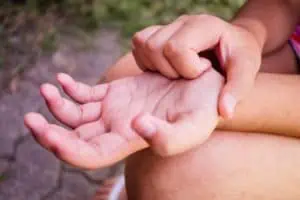
Medically reviewed by: Julie Forero, DO
The itchy palm superstition holds that if you have itchy palms, you’re about to experience good luck, come into money or meet someone new. But in reality, itching palms aren’t a sign of anything other than a skin or health condition that causes itching. So what causes itchy palms?
Common itchy palm causes
If you’re wondering “Why are my palms itchy?”, one of these problems may be the culprit.
Dry skin
Itching can occur due to dry skin. You may not be using hand cream often enough, or maybe you have a job that requires you to wash your hands frequently or involves keeping your hands immersed in water, which dries out the skin. The chemicals in cleaning products can also sap moisture from your hands and cause irritation that triggers itchiness.
You’re more likely to develop itchy palms when the air is dry, such as during the winter, or if you live in a dry part of the country.
Eczema (atopic dermatitis)
Itching is one of the signs of eczema, an inflammatory skin condition that can also cause cracks, bleeding and dryness to the point of peeling and flaking. A bad case of hand eczema can even cause your fingers to swell.
Eczema can be treated with over-the-counter hydrocortisone cream, prescription corticosteroid topical formulations, prescription non-steroidal creams and ointments that tamp down the immune system, and antihistamines (if the eczema is triggered by allergies). More severe cases might be treated with biologic drugs (given by injection) or oral immune-modifying medications such as methotrexate or cyclosporine. Phototherapy (light therapy) is another option.
Contact dermatitis
Itching, redness, swelling and, in severe cases, tiny fluid-filled blisters are all symptoms of allergic contact dermatitis, an allergy to something you touch. Common allergens include poison ivy, latex, fragrances, preservatives in shampoo and other products, ingredients in cleaning products and metals in rings and other jewelry. These skin allergies often get worse over time.
Irritant contact dermatitis, which produces an itchy red rash, is caused by repeat exposure to irritating soaps, detergents or industrial chemicals.
Contact dermatitis is often treated with oral antihistamines and steroid creams. If your case is severe, you might be prescribed an oral steroid. Phototherapy can also be helpful for chronic, severe allergies.
Psoriasis
Psoriasis, an immune-mediated disease, causes skin cells to grow too quickly, which can lead to itching as well as patches of thick, red skin and silvery scales. The disease may affect any area of skin, including the palms. It’s treated in a variety of ways, including with topical and oral medicines, phototherapy (light therapy) and injected or infused biologics.
Diabetes
Diabetes and dry, itchy skin go hand in hand, for a host of reasons. For example, when there’s too much sugar in the blood, the body pulls more fluid from cells to make urine, which carries sugar out of the body. Diabetes also makes you more vulnerable to skin conditions that can cause itching, such as fungal infections.
Diabetes is often treated with insulin injections. A number of other injected drugs or oral drugs may also be prescribed. Getting your blood sugar under control can help ease itching. If your palms itch because you’ve developed a fungal infection, your doctor will likely recommend a topical or oral anti-fungal treatment.
Liver disease
Several types of liver diseases can cause itching. Examples include primary biliary cirrhosis (PBC), which is thought to be an autoimmune disease and mainly affects women. Itching of the hands and feet may be the first sign of PBC. Fatigue is another early symptom. Chronic hepatitis C, a lifelong liver infection caused by a virus, can cause itching anywhere on the body.
Researchers have several theories about why certain liver diseases cause itching, but none have been confirmed.
Doctors use blood tests and imaging tests, if needed, to diagnose PBC. Blood tests can confirm chronic hepatitis C.
In addition to treating the liver disease, itching can be eased by using over-the-counter topical corticosteroids (hydrocortisone). If you need more relief, your doctor may prescribe one of several medications that target possible underlying causes.
Itchy palms treatment
Moisturizing, avoiding allergens, applying a cool, damp cloth and treating any underlying condition can go a long way toward easing itchy palms in many cases.
If you’re not sure what’s causing your palm itching, it’s a good idea to see a board-certified dermatologist for evaluation. Some skin abnormalities of the palms may indicate a serious condition. Tripe palms, for example, is a very rare condition that thickens the skin of the palms and feet and may cause itching. It’s associated with several types of cancer.
How to prevent palm itching
A handful of lifestyle changes can reduce palm itching and help keep it at bay.
- Wash your hands in lukewarm water instead of hot water.
- Use a gentle, fragrance-free soap.
- Regularly apply a fragrance-free moisturizing cream or ointment — not a lotion. Lotions contain more water and don’t seal in moisture as well. Ingredients to look for include dimethicone, glycerin, petrolatum, ceramides and shea butter. Cetaphil, Eucerin and CeraVe are good brands to try.
- If your hands are extremely dry, try coating them with cream or ointment before bed. Cover them with socks or gloves to protect your sheets.
- Wear gloves in cold weather.
- Wear gloves for cleaning and dishwashing. If you react to latex, wear rubber or PVC gloves with a cotton liner, or PVC gloves over cotton gloves.
- Use a humidifier to add moisture to dry indoor air. Aim for humidity levels of 30% to 50%.
Written by: Jessica Brown, a health and science writer/editor based in Nanuet, New York. She has written for Prevention magazine, jnj.com, BCRF.org, and many other outlets.





